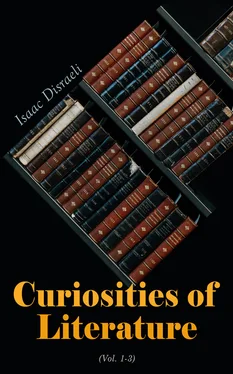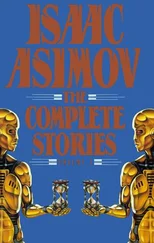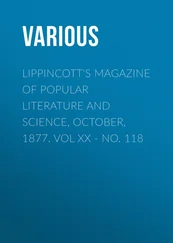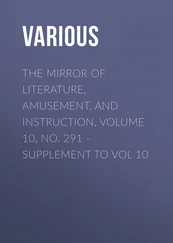Isaac Disraeli - Curiosities of Literature (Vol. 1-3)
Здесь есть возможность читать онлайн «Isaac Disraeli - Curiosities of Literature (Vol. 1-3)» — ознакомительный отрывок электронной книги совершенно бесплатно, а после прочтения отрывка купить полную версию. В некоторых случаях можно слушать аудио, скачать через торрент в формате fb2 и присутствует краткое содержание. Жанр: unrecognised, на английском языке. Описание произведения, (предисловие) а так же отзывы посетителей доступны на портале библиотеки ЛибКат.
- Название:Curiosities of Literature (Vol. 1-3)
- Автор:
- Жанр:
- Год:неизвестен
- ISBN:нет данных
- Рейтинг книги:3 / 5. Голосов: 1
-
Избранное:Добавить в избранное
- Отзывы:
-
Ваша оценка:
- 60
- 1
- 2
- 3
- 4
- 5
Curiosities of Literature (Vol. 1-3): краткое содержание, описание и аннотация
Предлагаем к чтению аннотацию, описание, краткое содержание или предисловие (зависит от того, что написал сам автор книги «Curiosities of Literature (Vol. 1-3)»). Если вы не нашли необходимую информацию о книге — напишите в комментариях, мы постараемся отыскать её.
Curiosities of Literature (Vol. 1-3) — читать онлайн ознакомительный отрывок
Ниже представлен текст книги, разбитый по страницам. Система сохранения места последней прочитанной страницы, позволяет с удобством читать онлайн бесплатно книгу «Curiosities of Literature (Vol. 1-3)», без необходимости каждый раз заново искать на чём Вы остановились. Поставьте закладку, и сможете в любой момент перейти на страницу, на которой закончили чтение.
Интервал:
Закладка:
Table of Contents
The origin of the theatrical representations of the ancients has been traced back to a Grecian stroller singing in a cart to the honour of Bacchus. Our European exhibitions, perhaps as rude in their commencement, were likewise for a long time devoted to pious purposes, under the titles of Mysteries and Moralities. Of these primeval compositions of the drama of modern Europe, I have collected some anecdotes and some specimens.96
It appears that pilgrims introduced these devout spectacles. Those who returned from the Holy Land or other consecrated places composed canticles of their travels, and amused their religious fancies by interweaving scenes of which Christ, the Apostles, and other objects of devotion, served as the themes. Menestrier informs us that these pilgrims travelled in troops, and stood in the public streets, where they recited their poems, with their staff in hand; while their chaplets and cloaks, covered with shells and images of various colours formed a picturesque exhibition, which at length excited the piety of the citizens to erect occasionally a stage on an extensive spot of ground. These spectacles served as the amusements and instruction of the people. So attractive were these gross exhibitions in the middle ages, that they formed one of the principal ornaments of the reception of princes on their public entrances.
When the Mysteries were performed at a more improved period, the actors were distinguished characters, and frequently consisted of the ecclesiastics of the neighbouring villages, who incorporated themselves under the title of Confrères de la Passion . Their productions were divided, not into acts, but into different days of performance, and they were performed in the open plain. This was at least conformable to the critical precept of that mad knight whose opinion is noticed by Pope. It appears by a MS. in the Harleian library, that they were thought to contribute so much to the information and instruction of the people, that one of the Popes granted a pardon of one thousand days to every person who resorted peaceably to the plays performed in the Whitsun week at Chester, beginning with "The Creation," and ending with the "General Judgment." These were performed at the expense of the different corporations of that city, and the reader may smile at the ludicrous combinations. "The Creation" was performed by the Drapers; the "Deluge" by the Dyers; "Abraham, Melchisedech, and Lot," by the Barbers; "The Purification" by the Blacksmiths; "The Last Supper" by the Bakers; the "Resurrection" by the Skinners; and the "Ascension" by the Tailors. In these pieces the actors represented the person of the Almighty without being sensible of the gross impiety. So unskilful were they in this infancy of the theatrical art, that very serious consequences were produced by their ridiculous blunders and ill-managed machinery. The following singular anecdotes are preserved, concerning a Mystery which took up several days in the performance.
"In the year 1437, when Conrad Bayer, Bishop of Metz, caused the Mystery of 'The Passion' to be represented on the plain of Veximel near that city, God was an old gentleman , named Mr. Nicholas Neufchatel, of Touraine, curate of Saint Victory, of Metz, and who was very near expiring on the cross had he not been timely assisted. He was so enfeebled, that it was agreed another priest should be placed on the cross the next day, to finish the representation of the person crucified, and which was done; at the same time Mr. Nicholas undertook to perform 'The Resurrection,' which being a less difficult task, he did it admirably well."—Another priest, whose name was Mr. John de Nicey, curate of Metrange, personated Judas, and he had like to have been stifled while he hung on the tree, for his neck slipped; this being at length luckily perceived, he was quickly cut down and recovered.
John Bouchet, in his "Annales d'Aquitaine," a work which contains many curious circumstances of the times, written with that agreeable simplicity which characterises the old writers, informs us, that in 1486 he saw played and exhibited in Mysteries by persons of Poitiers, "The Nativity, Passion, and Resurrection of Christ," in great triumph and splendour; there were assembled on this occasion most of the ladies and gentlemen of the neighbouring counties.
We will now examine the Mysteries themselves. I prefer for this purpose to give a specimen from the French, which are livelier than our own. It is necessary to premise to the reader, that my versions being in prose will probably lose much of that quaint expression and vulgar naïveté which prevail through the originals, written in octo-syllabic verses.
One of these Mysteries has for its subject the election of an apostle to supply the place of the traitor Judas. A dignity so awful is conferred in the meanest manner; it is done by drawing straws, of which he who gets the longest becomes the apostle. Louis Chocquet was a favourite composer of these religious performances: when he attempts the pathetic, he has constantly recourse to devils; but, as these characters are sustained with little propriety, his pathos succeeds in raising a laugh. In the following dialogue Annas and Caiaphas are introduced conversing about St. Peter and St. John:——
annas.
I remember them once very honest people. They have often brought
their fish to my house to sell.
caiaphas.
Is this true?
annas.
By God, it is true; my servants remember them very well. To live
more at their ease they have left off business; or perhaps they were in
want of customers. Since that time they have followed Jesus, that wicked
heretic, who has taught them magic; the fellow understands necromancy,
and is the greatest magician alive, as far as Rome itself.
St. John, attacked by the satellites of Domitian, amongst whom the author has placed Longinus and Patroclus, gives regular answers to their insulting interrogatories. Some of these I shall transcribe; but leave to the reader's conjectures the replies of the Saint, which are not difficult to anticipate.
parthemia.
You tell us strange things, to say there is but one God in three persons.
longinus.
Is it any where said that we must believe your old prophets (with whom your memory seems overburdened) to be more perfect than our gods?
pathoclus. You must be very cunning to maintain impossibilities. Now listen to me: Is it possible that a virgin can bring forth a child without ceasing to be a virgin?
domitian.
Will you not change these foolish sentiments? Would you pervert us? Will you not convert yourself? Lords! you perceive now very clearly what an obstinate fellow this is! Therefore let him be stripped and put into a great caldron of boiling oil. Let him die at the Latin Gate.
pesart.
The great devil of hell fetch me if I don't Latinise him well. Never shall they hear at the Latin Gate any one sing so well as he shall sing.
torneau.
I dare venture to say he won't complain of being frozen.
patroclus.
Frita, run quick; bring wood and coals, and make the caldron ready.
frita.
I promise him, if he has the gout or the itch, he will soon get rid of them.
St. John dies a perfect martyr, resigned to the boiling oil and gross jests of Patroclus and Longinus. One is astonished in the present times at the excessive absurdity, and indeed blasphemy, which the writers of these Moralities permitted themselves, and, what is more extraordinary, were permitted by an audience consisting of a whole town. An extract from the "Mystery of St. Dennis" is in the Duke de la Vallière's "Bibliothèque du Théâtre François depuis son Origine: Dresde, 1768."
The emperor Domitian, irritated against the Christians, persecutes them, and thus addresses one of his courtiers:——
Читать дальшеИнтервал:
Закладка:
Похожие книги на «Curiosities of Literature (Vol. 1-3)»
Представляем Вашему вниманию похожие книги на «Curiosities of Literature (Vol. 1-3)» списком для выбора. Мы отобрали схожую по названию и смыслу литературу в надежде предоставить читателям больше вариантов отыскать новые, интересные, ещё непрочитанные произведения.
Обсуждение, отзывы о книге «Curiosities of Literature (Vol. 1-3)» и просто собственные мнения читателей. Оставьте ваши комментарии, напишите, что Вы думаете о произведении, его смысле или главных героях. Укажите что конкретно понравилось, а что нет, и почему Вы так считаете.












